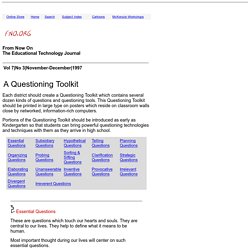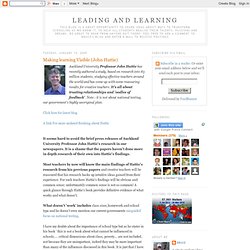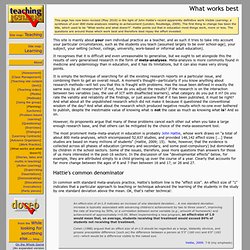

Questioning Toolkit. Essential Questions These are questions which touch our hearts and souls.

They are central to our lives. They help to define what it means to be human. Most important thought during our lives will center on such essential questions. What does it mean to be a good friend? If we were to draw a cluster diagram of the Questioning Toolkit, Essential Questions would be at the center of all the other types of questions. All the other questions and questioning skills serve the purpose of "casting light upon" or illuminating Essential Questions. Most Essential Questions are interdisciplinary in nature. Essential Questions probe the deepest issues confronting us . . . complex and baffling matters which elude simple answers: Life - Death - Marriage - Identity - Purpose - Betrayal - Honor - Integrity - Courage - Temptation - Faith - Leadership - Addiction - Invention - Inspiration.
Essential Questions are at the heart of the search for Truth. Essential Questions offer the organizing focus for a unit. 3_feedback_powerpoint. Questions and Answers About Formative Assessment. t11_providingpres. Feedback. New Zealand Travel ~ New Zealand Tourism ~ NZ Accommodation. Making learning Visible - John Hattie. Auckland University Professor John Hattie has recently authored a study, based on research into 83 million students, studying effective teachers around the world and has come up with some reassuring results for creative teachers.

It's all about trusting relationships and 'oodles of feedback'. Note - it is not about national testing, our government's highly unoriginal plan. Click here for latest blogA link For more undated thinking about Hattie It seems hard to avoid the brief press releases of Auckland University Professor John Hattie's research in our newspapers. It is a shame that the papers haven't done more in depth research of their own into Hattie's findings. Most teachers by now will know the main findings of Hattie's research from his previous papers and creative teachers will be reassured that his research backs up intuitive ideas gained from their experience. He also says that his book is not about qualitative studies. Viewcontent.cgi (application/pdf Object) Effects of Learning Skills Interventions on Student Learning: A Meta-Analysis. Writing at Master's Level.
These notes were originally prepared for fellow-tutors as a first contribution to a debate, and never intended for wider circulation, but feedback from their first accidental appearance justifies their (minimally revised) re-appearance, and requests from a number of universities to adapt and re-print them.

So you may have seen them somewhere else already! Recognising work at Master's level is one of those "I can't describe it, but I know it when I see it" situations. Unfortunately, that is not very much use to programme participants who want some idea of what to expect and what to work to. These pragmatic and potentially prejudiced notes may eventually lead to increased consistency in marking from the tutors' side, and a clearer idea of expectations from the participants' side - but so far all they do is to articulate some of the ways in which I go about recognising Master's level work.
Writing at Master's level is a specialised activity or genre. Frames of Reference. This is here for three reasons: To explain what I mean by "Frame of Reference" in Tools for Thought Reflexively, the very idea of a frame of reference (or its cousins, discourses) is an example of a tool for thought, and Quite differently, as an example of a basic (rather than a critical) literature review, which may be of use to students trying to get their heads around how it works "Frame of Reference: The context, viewpoint, or set of presuppositions or of evaluative criteria within which a person's perception and thinking seem always to occur, and which constrains selectively the course and outcome of these activities" Fontana Dictionary of Modern Thought (2nd edn: 1988) "We are told about the world before we see it.

We imagine most things before we experience them. and those preconceptions, unless education has made us acutely aware, govern deeply the whole process of perception. What works best. This page has now been revised (May 2010) in the light of John Hattie's recent apparently definitive work Visible Learning; a synthesis of over 800 meta-analyses relating to achievement (London; Routledge, 2009).

The first thing to change has been the title, which used to be "What works and what doesn't". Hattie points out that in education most things work, more or less. The questions are around those which work best and therefore best repay the effort invested. This site is mainly about your own individual practice as a teacher, and as such it tries to take into account your particular circumstances, such as the students you teach (assumed largely to be over school-age), your subject, your setting (school, college, university, work-based or informal adult education).
It recognises that it is difficult and even unreasonable to generalise, but we ought to set alongside this the results of very generalised research in the form of meta-analyses. Hattie, 2009: 7-8 (my emphasis) On phasing out feedback.